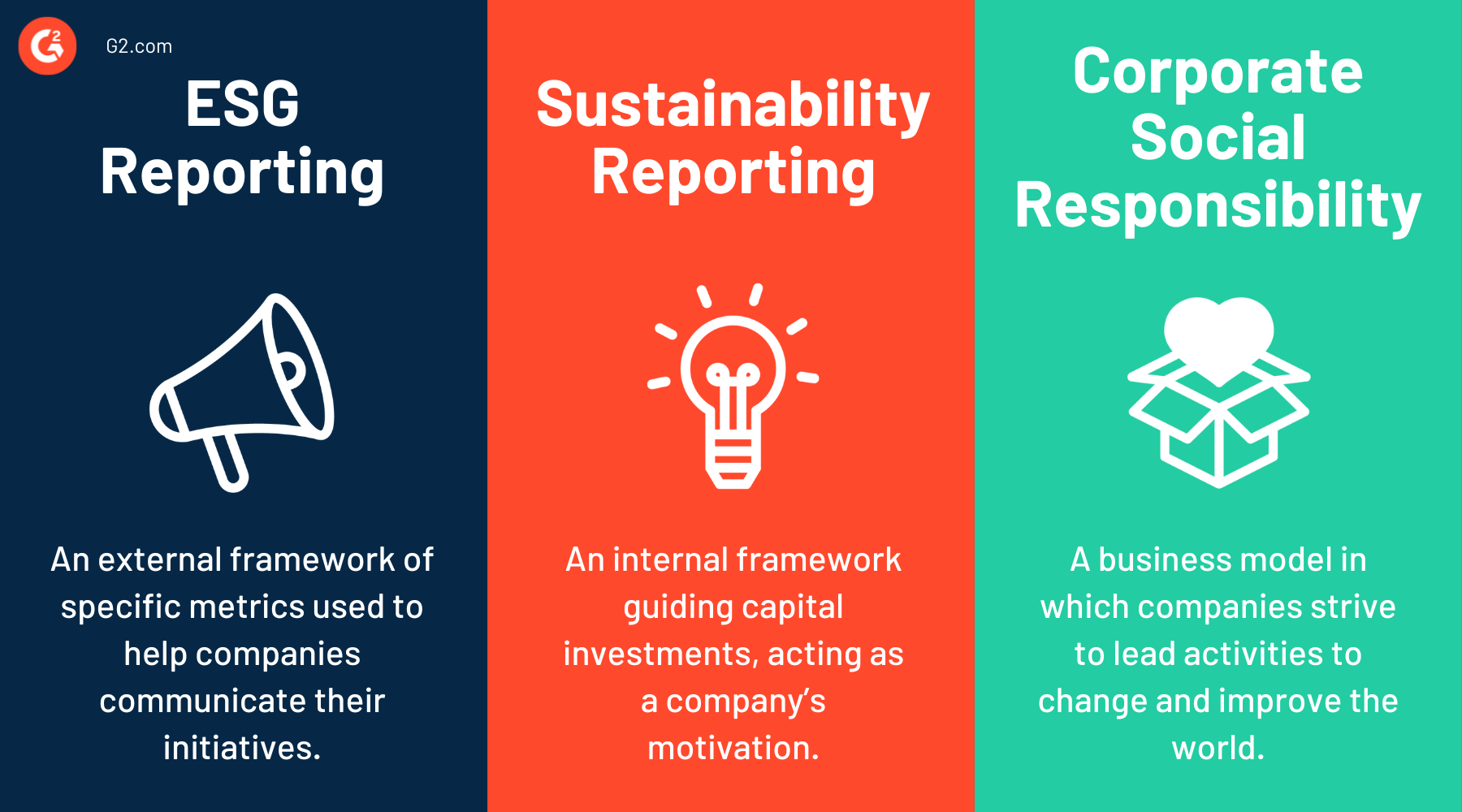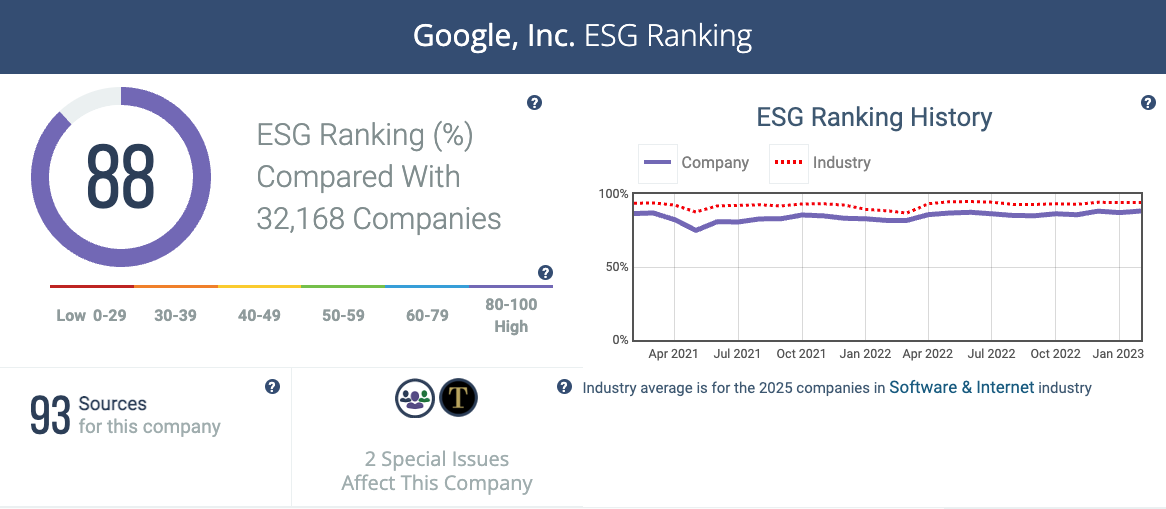We’ve all seen companies claim they’re on board with “going green” or how important diversity and inclusion are when hiring.
It’s hard for consumers and other stakeholders to know if these statements are true or simply performative, but environmental, social, and governance (ESG) reporting makes it easier.
What is ESG reporting?
ESG reporting is a type of corporate disclosure that details an organization's environmental, social, and governance (ESG) promises, efforts, and progress.
Covering performance in these reports attracts investors and financing while shedding light on various ESG activities and inspiring other companies to do the same. Corporate sustainability reporting can also demonstrate that a business's ESG projects are genuine and not filled with greenwashing or empty promises.
It also assures investors that they’re putting their money into companies that align with their own values. Businesses often utilize environmental, social, and governance (ESG) reporting software, so these reports have all the necessary data regarding their initiatives. Companies can then use the data in these reports to demonstrate their ability to implement ESG ambitions successfully. Essentially, a company can’t claim they’re “going green” without backing it up in this report.
ESG reporting vs. sustainability reporting vs. corporate social responsibility
ESG and sustainability reporting are sometimes used interchangeably, but there are some important differences.
While sustainability reporting goes over the details of a company’s relationship with the environment, ESG works to extend that relationship to social responsibility.
ESG is an external framework of specific metrics to help companies communicate their initiatives. It’s also how investors access the company’s performance and assumed risk. Sustainability reporting is seen as an internal framework guiding capital investments.
In short, sustainability acts as a company’s motivation, while ESP is the reported outcome.
Another term that ESG reporting is sometimes confused with is corporate social responsibility. In this instance, ESG reporting sets the standards that companies complete to communicate their sustainability initiatives. Stakeholders and investors use these reports to screen investments.
Corporate social responsibility (CSR) is a business model in which companies strive to lead activities to change and improve the world.

Want to learn more about Governance, Risk & Compliance Software? Explore Governance, Risk & Compliance products.
What's in an ESG report?
ESG reports include qualitative and quantitative data focusing on its three key topics.
1. Environmental
This section of the report centers on how an organization is improving the environment, how they use energy, and how they manage their environmental impact.
It may cover elements like:
- What an organization is doing to combat climate risk, climate change, greenhouse gas, and global warming.
- What an organization is doing to reduce their carbon emissions and lessen their carbon footprint.
- How an organization preserves biodiversity, combats deforestation, manages waste, and improves air and water quality.
- How an organization uses resources within its supply chain.
- Whether the organization mistreats animals through product testing, torture, or neglect.
$1.3 trillion
is the expected costs businesses can expect from climate-related weather incidents by 2026.
Source: CDP
2. Social
Next in the report is a social breakdown, meaning what the company is doing to improve lives. It also covers how it supports its people and culture, and how that impacts the broader community.
Under this section, a company may list:
- LGBTQ+, race, ethnicity, and gender-inclusive initiatives
- How it nurtures its people and workplace
- The employee engagement strategy
- Customer and community relations
- Details regarding data protection and privacy
- Details about community involvement
- Human rights and labor standards
- Work-life balance goals
- Political contributions
FAQ: Is ESG reporting mandatory in the United States?
The Security and Exchange Commission (SEC) requires all public companies to disclose information that may be material to investors, including details on ESG-related risks; it has issued guidance and rules setting forth its disclosure expectations. Private companies aren’t subject to ESG disclosures mandated by U.S. federal regulators.
3. Governance
Lastly is the governance portion of the report, which details the ways a company plans to stay ahead of corruption and keep all investments sustainable. In this section, a company may list:
- Its internal controls
- Shareholder rights
- Succession planning
- Regulatory compliance
It might also cover any policies or proceedings governing elements like shareholder rights, lobbying, whistleblower programs, bribery, executive compensation, audit committee structure, and board composition
Importance of ESG reporting
It’s crucial that all organizations take part in ESG reporting standards, which is how these efforts are documented. Doing so can lead to benefits such as:
- Creating transparency. Reporting a company’s ESG efforts means there’s openness surrounding solutions being created for the significant global challenges many organizations face due to climate change, equality, and data security. Developing these actionable solutions also holds companies accountable for their actions.
- Attracting investors and financing. Investors and lenders often use the data within an ESG report to drill into a company’s risk exposure and decide on its future financial performance. Usually, investors avoid companies that have failed to submit an ESG report with relevant data.
- Creating brand loyalty. It’s not just investors a company should worry about attracting – it’s customers, too. Consumers gravitate toward responsible brands. By demanding greater transparency regarding environmental and social concerns, customers get to choose to do business with organizations that align with their beliefs
- Responding to regulation changes. Companies are also pressured by regulatory forces to produce ESG reports. Meeting this criteria is part of the constantly changing business landscape centered around being future-focused.
76%
of consumers say they will stop buying from companies that treat the environment, employees, or the community in which they operate poorly.
Source: PWC
Common ESG frameworks
Companies can choose how they present their own ESG information for disclosure. However, some recognized ESG frameworks are recommended.
- The Global Reporting Initiative (GRI) is a framework helping companies share the positive and negative impacts their business can have on the economy, the environment, and society. The GRI standards focus on assisting companies in better communicating how they manage their ESG impacts. It’s the most popular, receiving 83% of all ESG frameworks.
- The Sustainability Accounting Standards Board (SASB) are standards companies use to collect and share the ESG data that affect business decisions. The SASB also explains the financial impact of its sustainability efforts.
- The Task Force on Climate-related Financial Disclosures (TCFD) is a framework that recommends how companies should manage and report climate risks. These financial risk disclosures correlated with the climate can help investors and shareholders fully understand a company’s climate-related ESG efforts.
- The Carbon Disclosure Project (CDP) is a nonprofit framework creating standards companies can use to disclose information related to greenhouse gas emissions, forestry, and water use.
What is an ESG score?
Companies are given an ESG score for their efforts. Similar to a credit score, it represents a business’s ability to meet its own ESG commitments while including elements like performance, risk management, and exposure.
These scores are assigned by third-party providers, each with a different set of criteria to score organizations. Some notable organizations that assign ESG scores are:
These ratings measure to what degree a company’s economic value is at risk due to ESG factors. The more a company is willing to report ESG performance, the higher the score. Failing to report ESG initiatives hurts a company’s score.
Scores are given from 0 - 100. A score of less than 50 is regarded as poor, while a score of more than 70 is considered excellent. The score breakdown for ESG metrics is as follows:
- Excellent: Indicates that best practices are being followed in all ESG areas and there are little to no internal or external problems.
- Good: Indicates a company is meeting best practices in each ESG category and there is a low negative impact on people or the planet.
- Average: Indicates a company is not on track to meet ESG benchmarks, but is actively working toward meaningful ESG goals.
- Poor: Indicates no best practices are being followed and the company is negatively impacting the environment and/or has employees who are being treated poorly.
For example, according to the Consensus ESG Ratings Hub, Google has an ESG score of 88.

Source: CSR Hub
Best practices for effective ESG reporting
For new organizations just getting started with the necessary ESG reporting requirements, consider these best practices as you go.
- Define objectives. Consider what you want to achieve and center goals around this. Having these goals is a must as you get started with reporting since you have so many different aspects of performance that you can measure, like your business's carbon footprint, water usage, and the number of new hires across diverse demographics.
- Identify stakeholders. Pinpoint those who will help the business align on goals and assist in making sure the correct data is a part of the report.
- Research leaders in the industry. Startups can learn from the ESG reports of industry leaders and follow in their footsteps.
- Be precise about the data. The ESG data collected for these reports must be clear and confirmable, so be sure to research it openly and honestly.
- Lean on the details. Your company’s ESG report doesn’t have to be a collection of figures and measurements – instead, provide the context surrounding this data and the efforts your company is making so that readers have perspective.
- Communicate the results. Take advantage of your website and social media to let stakeholders, customers, and potential employees know the results of your ESG initiatives.
Best environmental, social, and governance (ESG) reporting software
ESG reporting software collects and analyzes data based on ESG initiatives, typically including corporate social responsibility, sustainability, diversity, equity, and inclusion. This information is then used to establish reports based on a company’s ability to achieve its ESG goals.
Companies often rely on this software to keep track of their ESG initiatives, while investors may turn to them to evaluate which businesses they’d like to acquire or fund. These tools are often used in tandem with other software that can provide ESG data, such as corporate governance, risk, and compliance solutions, corporate social responsibility software, and sustainability management software.
To be included in the environmental, sustainability, and governance (ESG) reporting software category, a product must:
- Analyze and combine data from ESG software and other data sources
- Feature a dashboard where users can monitor ESG indicators in real time
- Create reports about sustainability or diversity and inclusion
- Track custom KPIs and ESG-related reports
- Issue internal and external ESG reports while remaining confidential
- Provide metrics regarding carbon footprint and social or economical impact
* Below are the top five leading environmental, social, and governance (ESG) Reporting software solutions based on popularity, pulled from G2 on May 22, 2023. Some reviews may be edited for clarity.
1. Workiva
As a regulatory, financial, and ESG reporting solution, Workiva powers reporting with transparency and full disclosure of financial and non-financial dealings. Workiva simplifies the challenging elements of ESG reporting by connecting data and teams with simple processes that create a sustainable strategy.
What users like best:
“Workiva makes something as meticulous as SEC filings approachable. I appreciated the prompt responses from Workiva support a few days before filing and even the hour before. I recommend Workiva to a colleague, especially if they want to streamline all earnings cycle processes (earnings release, shareholder letter, etc.).
- Workiva Review, Amanda W.
What users dislike:
“I don't know if it is just our environment, but the inability to copy and paste the contents of a request is extremely frustrating and limiting. For back-and-forth comments, the fact that it is all in a single field and not saved/filed separately seems like an opportunity for improvement.”
- Workiva Review, Brant M.
2. Workday Adaptive Planning
Workday Adaptive Planning aims to make it possible for organizations of all sizes to adapt to a changing world and shift their business conditions and practices with confidence and agility. Workday partners with organizations on their ESG goals to help them meet stakeholder and regulatory expectations.
What users like best:
“One of the most impressive aspects of Workday Adaptive Planning is its agility, which allows organizations to quickly and easily adapt to changes in the business environment.
For example, during corporate restructuring, business expansions, acquisitions, and mergers, we found that updating the modeling was painless. It's easy to modify the hierarchy of entities, add new dimensions for sales regions, and even rebuild the models to meet new requirements due to acquisitions.
Workday Adaptive Planning's flexibility and real-time data capabilities made the process smooth and efficient. Overall, its agility is a key strength of the software that helps organizations confidently make data-driven decisions.”
- Workday Adaptive Planning Review, Herman L.
What users dislike:
“I wish that it had direct plugins with more human capital management (HCM) providers. It would make it much easier for planning purposes when updating the forecasted roster, rather than having to manually upload a roster every time we update the forecast.”
- Workday Adaptive Planning Review, Sam A.
3. Ethos Tracking
Ethos Tracking is a data tracking and management platform built by social impact professionals for those looking to make a significant social impact. This tool makes it simple for all foundations, nonprofits, businesses, and individuals to communicate and measure their social impact clearly.
What users like best:
“What I liked the most about this product is the focus on social impact and a zeal to make this world a better place. It allows one to get a holistic view of the work and manage it in a better way. It also helps in staying organized.”
- Ethos Tracking Review, Rishabh A.
What users dislike:
“No available software ecosystem built for our Windows desktops or mobile (both Android and iPhone). Customization and making other changes is a little time-consuming. The pricing model is a bit on the higher side, too.”
- Ethos Tracking Review, Sudip D.
4. Persefoni
Persefoni is a climate disclosure and carbon accounting solution businesses can use at every step of their carbon journey. By helping companies navigate the path to decarbonization with deep insights and analyses based on their specific industry and net zero targets, businesses have a better chance of achieving their ESG goals.
What users like best:
“We needed a partner to help measure our carbon footprint, and we wanted a technology platform first – not a consultant. We got both with Persefoni. They are exceptional.”
- Persefoni Review, Rachael R.
What users dislike:
“The platform has useful information, but it's not the easiest user interface. Even after reviewing it with the Persefoni Team, I kept getting lost when I wanted to find new info or features. It could be more intuitive.”
- Persefoni Review, Nicolas Z.
5. IBM Envizi ESG Suite
For comprehensive data and analytics collection, along with the ability to manage and derive insights from environmental, social, and governance data, companies should look no further than IBM Envizi ESG Suite. This tool builds a solid foundation for ESG data while simplifying how reports are made and identifying emissions savings.
What users like best:
“I am particularly impressed with the comprehensive nature of IBM Envizi ESG Suite, which provides organizations with an integrated ESG data management, analysis, and reporting solution. The advanced analytics capabilities, data accuracy, integrity, and actionable insights it offers are most helpful in driving sustainability improvements, optimizing resource allocation, financial reporting, and enhancing stakeholder communication.
The advantages of using IBM Envizi ESG Suite include streamlining ESG processes, improving data accuracy, enhancing brand reputation, reducing risks, and creating long-term value through sustainable investments and practices.”
- IBM Envizi ESG Suite Review, Darshani P.
What users dislike:
“The cost of IBM Envizi ESG Suite is very high. Sometimes your system will stop while you’re using this application, or it will close automatically.”
- IBM Envizi ESG Suite Review, Santhiya R.
A brighter tomorrow
An ESG strategy improves decision-making surrounding environmental and community impact. ESG reporting guarantees that companies are doing their part to be more thoughtful about the environment and how they can implement small (and large!) changes to make the world a better place.
Learn more about our new ESG reporting category and why this type of software is important for businesses.

Mara Calvello
Mara Calvello is a Content and Communications Manager at G2. She received her Bachelor of Arts degree from Elmhurst College (now Elmhurst University). Mara writes customer marketing content, while also focusing on social media and communications for G2. She previously wrote content to support our G2 Tea newsletter, as well as categories on artificial intelligence, natural language understanding (NLU), AI code generation, synthetic data, and more. In her spare time, she's out exploring with her rescue dog Zeke or enjoying a good book.

